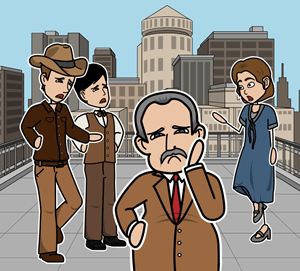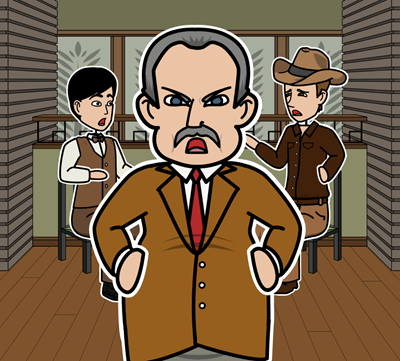Lesson Plan Overview
As students read, a storyboard can serve as a helpful character reference log. This log (also called a character map) allows students to recall relevant information about important characters. With character mapping, it’s easy for students to follow along and catch the subtleties which make reading more enjoyable!
Clicking "Use This Assignment" will copy both the example above and a blank template into your account. Feel free to use it as is, or to edit it for the level of your class. Printing it as worksheets, for your students to complete while reading, is a fast and easy way to incorporate this character map into your classroom.
Character List
| Willy Loman | A traveling salesman from New York, though the audience never learns what it is that he sells. He is the major protagonist and tragic hero. His inability to obtain his ideal of the American Dream and to be successful leads to his death. |
|---|---|
| Linda | Willy's wife is a stay at home mother who raised their two sons. She becomes worried about Willy as he gets older and seems to be losing his mind. She asks her now grown boys to come visit and talk to their father. |
| Happy | Willy and Linda’s seemingly forgotten, or at least ignored, son. He follows in his father's footsteps, venturing into the business world. He is in his 30s and has not settled down yet. Instead, he is frequently seen with a call girl. |
| Biff | The prodigal son that Willy had high ambitions for. Often in the play, Willy is seen interacting with Biff and instilling in him that it is more important to be well liked than industrious or smart. Biff moves away to work as a ranch hand in the west. He repents his ways after his father's death and vows to live a meaningful life. |
| Charley | Charley is Willy's neighbor who was a smart businessman and became wealthy through hard work. His son, Bernard, is seen in flashbacks stressing about passing math and being studious; he later grew up to be a lawyer. When Willy is down and out, Charley offers him a job, but prideful Willy refuses. |
| Ben | Ben is Willy's brother who, by happenstance, found riches in the jungle of Africa. Ben represents Willy's beliefs that it is luck and charm that make a man wealthy and not hard work. |
Template and Class Instructions
(These instructions are completely customizable. After clicking "Copy Activity", update the instructions on the Edit Tab of the assignment.)
Student Instructions
Create a character map for the major characters.
- Identify the major characters in Death of a Salesman and type their names into the different title boxes.
- Choose a character to represent each of the literary characters.
- Select colors and a pose appropriate to story and character traits.
- Choose a scene or background that makes sense for the character.
- Fill in the text boxes for Traits, Major Quotes, Failure or Success.
Lesson Plan Reference
Student Rubric
(You can also create your own on Quick Rubric.)
| Proficient 33 Points | Emerging 25 Points | Beginning 17 Points | |
|---|---|---|---|
| Character Picture & Scene | The characters and scenes are both appropriate for the book's characters. | Many of the characters and scenes match the book's characters. | More than half of the characters and scenes do not match the characters in the book. |
| Accuracy of Notes | Most of the information of the notes is correct. | Many of the notes have correct information, but some are incorrect or missing. | Less than half of the information of the notes is correct and relevant. |
| Effort | Work is complete, thorough, and neat. | Most of the sections of the character map were at least attempted and work is presentable. | Character map is unfinished and/or disorganized. |
Lesson Plan Overview
As students read, a storyboard can serve as a helpful character reference log. This log (also called a character map) allows students to recall relevant information about important characters. With character mapping, it’s easy for students to follow along and catch the subtleties which make reading more enjoyable!
Clicking "Use This Assignment" will copy both the example above and a blank template into your account. Feel free to use it as is, or to edit it for the level of your class. Printing it as worksheets, for your students to complete while reading, is a fast and easy way to incorporate this character map into your classroom.
Character List
| Willy Loman | A traveling salesman from New York, though the audience never learns what it is that he sells. He is the major protagonist and tragic hero. His inability to obtain his ideal of the American Dream and to be successful leads to his death. |
|---|---|
| Linda | Willy's wife is a stay at home mother who raised their two sons. She becomes worried about Willy as he gets older and seems to be losing his mind. She asks her now grown boys to come visit and talk to their father. |
| Happy | Willy and Linda’s seemingly forgotten, or at least ignored, son. He follows in his father's footsteps, venturing into the business world. He is in his 30s and has not settled down yet. Instead, he is frequently seen with a call girl. |
| Biff | The prodigal son that Willy had high ambitions for. Often in the play, Willy is seen interacting with Biff and instilling in him that it is more important to be well liked than industrious or smart. Biff moves away to work as a ranch hand in the west. He repents his ways after his father's death and vows to live a meaningful life. |
| Charley | Charley is Willy's neighbor who was a smart businessman and became wealthy through hard work. His son, Bernard, is seen in flashbacks stressing about passing math and being studious; he later grew up to be a lawyer. When Willy is down and out, Charley offers him a job, but prideful Willy refuses. |
| Ben | Ben is Willy's brother who, by happenstance, found riches in the jungle of Africa. Ben represents Willy's beliefs that it is luck and charm that make a man wealthy and not hard work. |
Template and Class Instructions
(These instructions are completely customizable. After clicking "Copy Activity", update the instructions on the Edit Tab of the assignment.)
Student Instructions
Create a character map for the major characters.
- Identify the major characters in Death of a Salesman and type their names into the different title boxes.
- Choose a character to represent each of the literary characters.
- Select colors and a pose appropriate to story and character traits.
- Choose a scene or background that makes sense for the character.
- Fill in the text boxes for Traits, Major Quotes, Failure or Success.
Lesson Plan Reference
Student Rubric
(You can also create your own on Quick Rubric.)
| Proficient 33 Points | Emerging 25 Points | Beginning 17 Points | |
|---|---|---|---|
| Character Picture & Scene | The characters and scenes are both appropriate for the book's characters. | Many of the characters and scenes match the book's characters. | More than half of the characters and scenes do not match the characters in the book. |
| Accuracy of Notes | Most of the information of the notes is correct. | Many of the notes have correct information, but some are incorrect or missing. | Less than half of the information of the notes is correct and relevant. |
| Effort | Work is complete, thorough, and neat. | Most of the sections of the character map were at least attempted and work is presentable. | Character map is unfinished and/or disorganized. |
How Tos about Death of a Salesman Characters
Incorporate character maps into literature discussions for deeper analysis
Bring character maps into your class conversations by assigning students to reference or update their maps during group or whole-class discussions. This helps students connect character traits, motivations, and changes as the story unfolds, making literary analysis more interactive and meaningful.
Model how to fill out a character map with a think-aloud
Demonstrate your thought process by projecting a blank character map and talking through how you identify a character’s traits, key quotes, and major actions. Use textual evidence and reasoning aloud so students see how to make connections from the text to their maps.
Assign peer review of character maps for collaborative learning
Pair students to exchange character maps and provide feedback or suggestions. Encourage them to notice overlooked details or offer new interpretations. This peer review process builds critical thinking and helps students refine their understanding of each character.
Use completed character maps for essay planning and evidence gathering
Guide students to use their finished maps as a resource for planning analytical essays or answering comprehension questions. Highlight how details from the map can serve as direct evidence in written responses, improving both organization and argument strength.
Frequently Asked Questions about Death of a Salesman Characters
What is a character map for Death of a Salesman?
A character map for Death of a Salesman is a visual tool that helps students organize and track information about the main characters, their traits, relationships, and significant quotes, making it easier to understand the play's dynamics.
How can I use a character map worksheet in my classroom?
You can print or assign a character map worksheet for students to fill in as they read. This encourages close reading by having them note traits, quotes, and character developments, helping them engage more deeply with the text.
Who are the main characters in Death of a Salesman?
The main characters in Death of a Salesman are Willy Loman, Linda, Biff, Happy, Charley, Bernard, and Ben. Each plays a key role in highlighting themes like the American Dream and family dynamics.
What traits should students include for each character in a character map?
Students should include personality traits (e.g., ambitious, conflicted), major quotes, and note each character’s successes or failures. This helps analyze motivations and relationships within the play.
What is the best way to help students track character development in Death of a Salesman?
The best way is to use a character map or log throughout the reading, updating it with new insights on traits, key scenes, and turning points. This visual aid supports comprehension and critical thinking.
More Storyboard That Activities
Death of a Salesman
Testimonials

“By using the product, they were so excited and they learned so much...”–K-5 Librarian and Instructinal Technology Teacher

“I'm doing a Napoleon timeline and I'm having [students] determine whether or not Napoleon was a good guy or a bad guy or somewhere in between.”–History and Special Ed Teacher

“Students get to be creative with Storyboard That and there's so many visuals for them to pick from... It makes it really accessible for all students in the class.”–Third Grade Teacher
© 2026 - Clever Prototypes, LLC - All rights reserved.
StoryboardThat is a trademark of Clever Prototypes, LLC, and Registered in U.S. Patent and Trademark Office







